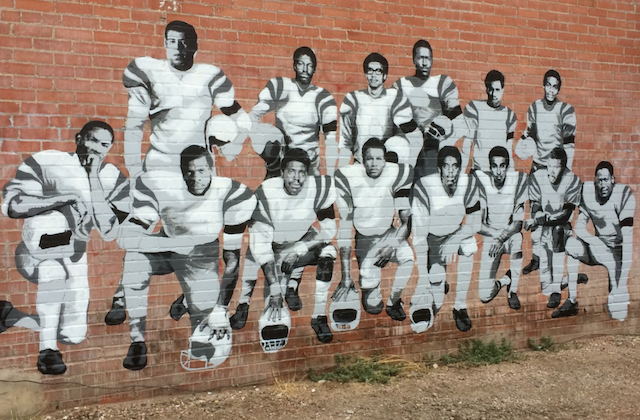Nearly a half-decade before Colin Kaepernick jeopardized his National Football League (NFL) career to protest anti-Black racism, 14 Black University of Wyoming football players were expelled from the team for planning a demonstration against similar injustice. Documentarian Darius Clark Monroe ("Evolution of a Criminal") revisits the athletes’ planned action and ensuing backlash in "Black 14," a new short documentary that debuted on streaming platform Topic.com today (March 6).
According to the Wyoming State Historical Society, the Black 14 moniker refers to Willie Black, a doctoral student at the University of Wyoming and chancellor of the school’s Black Student Alliance in October 1969. Black learned that The Church of Jesus Christ of Latter-day Saints, or the Mormon Church, barred Black members from the priesthood and viewed Black skin as a curse. So he followed in the footsteps of students at San Jose State University and the University of Texas at El Paso and organized alliance members, including the 14 Black players, to protest an upcoming game against Brigham Young University (BYU), which is opeprated by the church.
The Historical Society recounts that, after hearing that football coach Lloyd Eaton had a rule against athletes participating in protests, the students decided to meet with him. The players wore black armbands for the meeting, and Eaton, a White man, summarily dropped them from the team.
"Coach Eaton stated that in past time, he has had some good colored boys, some good Negro boys, but now he is dealing with Black men, and he doesn’t know how to cope with it," Willie Hysaw, one of the expelled players, said in an archival interview about the players’ exchange with Eaton.
"Black 14" uses this video alongside clips of Eaton’s speeches, player statements and demonstrations to show how the players risked their public image to protest. The footage highlights how White community members supported Eaton, with several BYU game attendees wearing armbands with his name printed on them. It also reveals how little outright support the players had at the time, with the university’s Board of Trustees upholding Eaton’s decision. Ten of the 14 players transferred, ending their playing careers at Wyoming. Only two, Tony McGee and Joe Williams, found success in the NFL. Eaton retired from coaching in 1970, after responding to pressure from the players’ limited supporters (including other students and faculty) to amend player protocol to allow off-field protests.
Monroe told Colorlines that he based the 15-minute documentary around archival footage to fully demonstrate the backlash the players faced. "The story of the Black 14 is often a story about how they were victimized by the system while ignoring the perpetrators, who happen to be the White people in town and at the university," he said. "The archival footage also exposes this very polite but insidious version of White pathology and cognitive dissonance, which was essentially the reason these players protested in the first place."
Monroe added why he wanted to focus on this aspect of the story, which he called "the central character" of the film. "I don’t want to call it ‘White fragility,’ because it is a pathology of being hypocritical on one’s own understanding of morality," he explained. "It shouldn’t be a surprise to anyone that White people having, in ’69 and even up until today, a very difficult time processing a reality where their voice is not centralized. There’s this belief that we shouldn’t speak about Whiteness or White identity as a participant and real-life force that impacts lives, emotionally and economically. The film is speaking to this idea in a snapshot—whether it’s White pathology created by the Mormon Church, Eaton, the University of Wyoming community or the United States of America."
